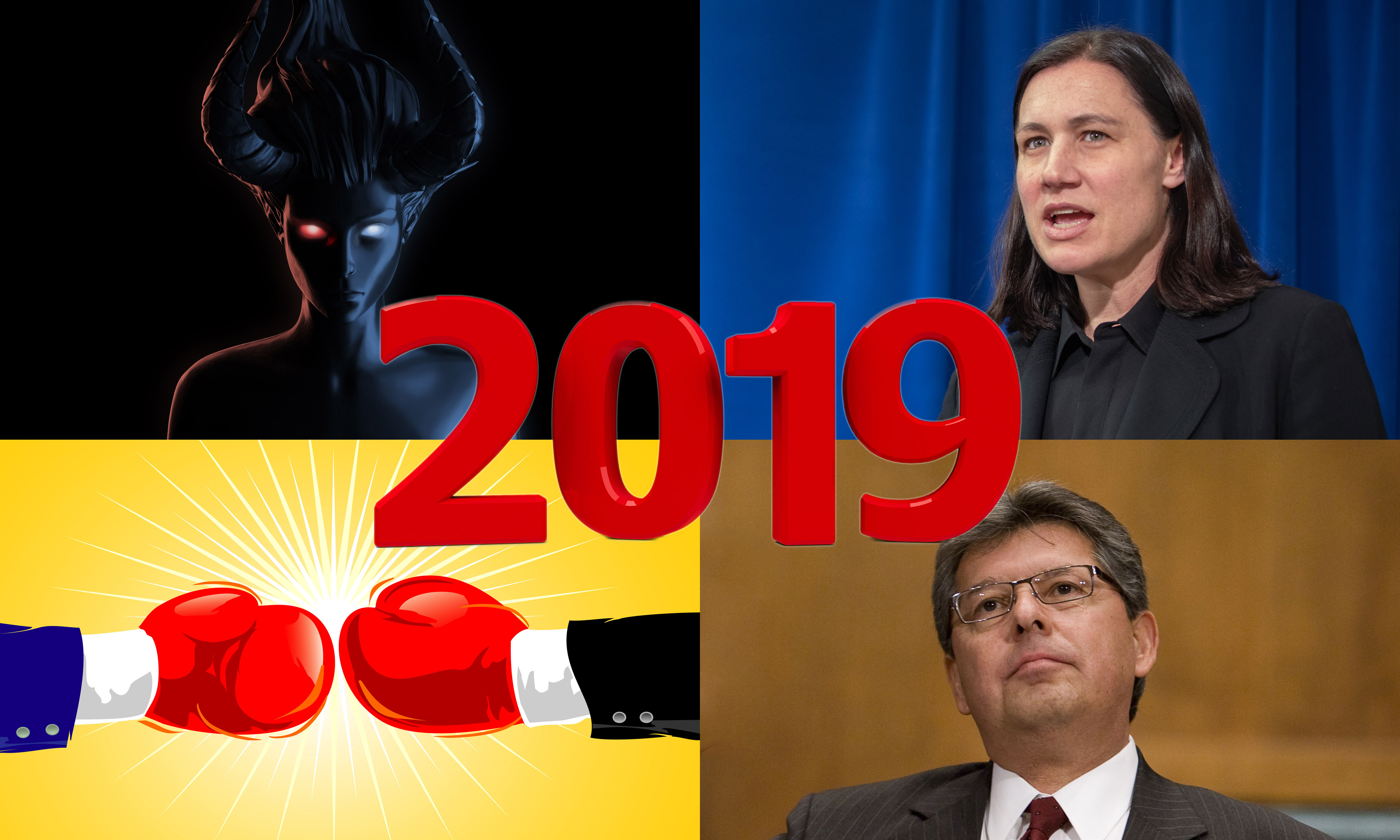4 Cases in California Where Lawyers Irked the Judge in 2019
A handful of stinging bench slaps from the past year's coverage in The Recorder.
December 27, 2019 at 12:00 PM
4 minute read

Judges can be a testy sort. And lawyers can be the sort that sometimes test testy sorts. Here, in no particular order are a handful of cases from The Recorder's coverage over the past year where lawyers have tested jurists' patience.
'Stop With the Invective'
Administrative Law Judge Richard Clark this summer let lawyers from the U.S. Labor Department and Oracle Corp.'s outside counsel at Orrick, Herrington & Sutcliffe know that he was tired of their "confrontational" approach to meet and confers in the federal agency's pay-discrimination suit against the enterprise software giant.
"Whether intentional or not, the parties are shifting the responsibility to the court for resolving what appear to be issues well within their capabilities to figure out on their own," Clark wrote. The judge added: "I have mentioned this before—stop with the invective and contentious email communications, get on the phone or meet in person, and get these issues resolved."
A Choice Word Choice
The Fourth District Court of Appeal in March referred San Diego attorney Benjamin Pavone to the State Bar, finding that he committed misconduct and demonstrated gender bias by labeling the ruling of a female trial judge who denied him attorney fees as "succubustic." A succubus, the appellate court noted in a published opinion, is a demon who assumes female form and has sex with men in their sleep. The court wrote that it chose to publish the decision in part "to make the point that gender bias by an attorney appearing before us will not be tolerated, period."
Pavone, for his part, maintained that the trial court's ruling was based on the faulty conclusion that he'd fabricated billing records. "It is not reasonable to assume a self-respecting lawyer will stand for being unfairly accused and morally impugned and not fight back," he said in an email to The Recorder shortly after the appellate ruling was handed down.
Keep Confidential Material Confident or Face a Loss of Confidence
It's always nice to be called one of the "best lawyers in the country" by a judge, as Joseph Cotchett and Mark Molumphy were by U.S. District Judge Edward Davila in San Jose back in May. But, given the context in which Davila paid the compliment, it was a bit less nice: a hearing on a sanctions motions against the two principals at Cotchett, Pitre & McCarthy.
Apple accused the two lawyers of violating a protective order in the case by quoting from documents labeled "highly confidential—attorneys' eyes only" in open court during the litigation accusing Apple of intentionally slowing data speeds for older iPhones.
Davila in June stopped short of removing Cotchett and Molumphy from the case as Apple asked. He did, however, say that the company's cost of bringing the sanctions motion would be deducted from any potential attorneys' fee awarded in the case and that Cotchett, who had read directly from the protected material, must get court permission before arguing any more motions in the case.
Getting Off on the Wrong Foot With the Judge
U.S. District Judge Vince Chhabria had plenty of problems with the opening statement that plaintiffs lawyer Aimee Wagstaff of Andrus Wagstaff gave in the first case to go to trial in the multidistrict litigation accusing Monsanto's Roundup herbicide of causing cancer. Chhabria repeatedly interrupted Wagstaff and said that she was deliberately violating his pretrial orders to stick to scientific evidence about whether Roundup causes cancer in humans in the first trial's phase. Chhabria held a hearing after the second day of trial to determine whether to sanction Wagstaff for what he said was a "premeditated" effort to defy court orders.
The judge ultimately sanctioned Wagstaff $500 for what he called "obvious violations" and forced the rest of the team of six lawyers who helped her prepare for openings to explain why they shouldn't face the same penalty. Chhabria later sanctioned Wagstaff's co-counsel, Jennifer Moore of the Moore Law Group, the same amount finding she "intentionally joined the bad faith conduct." After the sanction order was handed down, Moore said via email that the judge had "no legal or factual basis for sanctioning Ms. Wagstaff or me and we are considering our options."
This content has been archived. It is available through our partners, LexisNexis® and Bloomberg Law.
To view this content, please continue to their sites.
Not a Lexis Subscriber?
Subscribe Now
Not a Bloomberg Law Subscriber?
Subscribe Now
NOT FOR REPRINT
© 2025 ALM Global, LLC, All Rights Reserved. Request academic re-use from www.copyright.com. All other uses, submit a request to [email protected]. For more information visit Asset & Logo Licensing.
You Might Like
View All
Law Firms Look to Gen Z for AI Skills, as 'Data Becomes the Oil of Legal'


Orrick Hires Longtime Weil Partner as New Head of Antitrust Litigation
Law Firms Mentioned
Trending Stories
- 1Uber Files RICO Suit Against Plaintiff-Side Firms Alleging Fraudulent Injury Claims
- 2The Law Firm Disrupted: Scrutinizing the Elephant More Than the Mouse
- 3Inherent Diminished Value Damages Unavailable to 3rd-Party Claimants, Court Says
- 4Pa. Defense Firm Sued by Client Over Ex-Eagles Player's $43.5M Med Mal Win
- 5Losses Mount at Morris Manning, but Departing Ex-Chair Stays Bullish About His Old Firm's Future
Who Got The Work
J. Brugh Lower of Gibbons has entered an appearance for industrial equipment supplier Devco Corporation in a pending trademark infringement lawsuit. The suit, accusing the defendant of selling knock-off Graco products, was filed Dec. 18 in New Jersey District Court by Rivkin Radler on behalf of Graco Inc. and Graco Minnesota. The case, assigned to U.S. District Judge Zahid N. Quraishi, is 3:24-cv-11294, Graco Inc. et al v. Devco Corporation.
Who Got The Work
Rebecca Maller-Stein and Kent A. Yalowitz of Arnold & Porter Kaye Scholer have entered their appearances for Hanaco Venture Capital and its executives, Lior Prosor and David Frankel, in a pending securities lawsuit. The action, filed on Dec. 24 in New York Southern District Court by Zell, Aron & Co. on behalf of Goldeneye Advisors, accuses the defendants of negligently and fraudulently managing the plaintiff's $1 million investment. The case, assigned to U.S. District Judge Vernon S. Broderick, is 1:24-cv-09918, Goldeneye Advisors, LLC v. Hanaco Venture Capital, Ltd. et al.
Who Got The Work
Attorneys from A&O Shearman has stepped in as defense counsel for Toronto-Dominion Bank and other defendants in a pending securities class action. The suit, filed Dec. 11 in New York Southern District Court by Bleichmar Fonti & Auld, accuses the defendants of concealing the bank's 'pervasive' deficiencies in regards to its compliance with the Bank Secrecy Act and the quality of its anti-money laundering controls. The case, assigned to U.S. District Judge Arun Subramanian, is 1:24-cv-09445, Gonzalez v. The Toronto-Dominion Bank et al.
Who Got The Work
Crown Castle International, a Pennsylvania company providing shared communications infrastructure, has turned to Luke D. Wolf of Gordon Rees Scully Mansukhani to fend off a pending breach-of-contract lawsuit. The court action, filed Nov. 25 in Michigan Eastern District Court by Hooper Hathaway PC on behalf of The Town Residences LLC, accuses Crown Castle of failing to transfer approximately $30,000 in utility payments from T-Mobile in breach of a roof-top lease and assignment agreement. The case, assigned to U.S. District Judge Susan K. Declercq, is 2:24-cv-13131, The Town Residences LLC v. T-Mobile US, Inc. et al.
Who Got The Work
Wilfred P. Coronato and Daniel M. Schwartz of McCarter & English have stepped in as defense counsel to Electrolux Home Products Inc. in a pending product liability lawsuit. The court action, filed Nov. 26 in New York Eastern District Court by Poulos Lopiccolo PC and Nagel Rice LLP on behalf of David Stern, alleges that the defendant's refrigerators’ drawers and shelving repeatedly break and fall apart within months after purchase. The case, assigned to U.S. District Judge Joan M. Azrack, is 2:24-cv-08204, Stern v. Electrolux Home Products, Inc.
Featured Firms
Law Offices of Gary Martin Hays & Associates, P.C.
(470) 294-1674
Law Offices of Mark E. Salomone
(857) 444-6468
Smith & Hassler
(713) 739-1250







